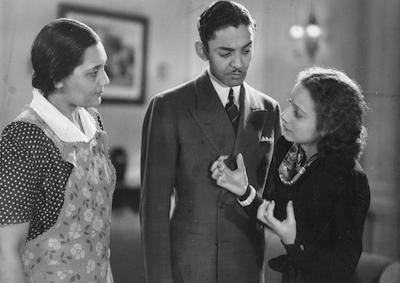35mm, b/w, approx. 2 min.
Restored from a 35mm nitrate print. Laboratory services by The Stanford Theatre Film Laboratory, Audio Mechanics, DJ Audio, Inc., Simon Daniel Sound.
God's Step Children / She Devil

Restored by UCLA Film & Television Archive with funding provided by The Packard Humanities Institute
God's Step Children — Trailer
35mm, b/w, approx. 2 min.
Restored from a 35mm nitrate print. Laboratory services by The Stanford Theatre Film Laboratory, Audio Mechanics, DJ Audio, Inc., Simon Daniel Sound.
Restored by UCLA Film & Television Archive with funding provided by The Packard Humanities Institute
God's Step Children (1938)
By the time God's Step Children was released in 1938, African American pioneer Oscar Micheaux had independently produced, written, directed and distributed more than 30 “race” pictures—movies made by Black artists for Black audiences, a necessary alternative to Hollywood's exclusionary studio system. The most prolific director of such films, emerging in the silent era with his 1919 epic The Homesteader, Micheaux strove to convey the middle-class aspirations of Blacks in America as well as the deleterious effects of Jim Crow. Sadly, fewer than half of his films survive today, many in poor condition. The Archive is pleased to restore the only known print of this late-career title.
Here, Micheaux revisits some of the issues of his earlier films: passing, miscegenation, and prejudice between Blacks of different skin tones. Naomi, a light-skinned Black child, is abandoned by her mother and raised by the virtuous Mrs. Saunders (Alice B. Russell, Micheaux's wife and collaborator). When the girl's fixation with whiteness turns her against her own race, she is sent to a convent. Hopelessly in love with her adoptive brother, Jimmie, Naomi consents to marry his friend, but is repulsed by his darker skin and unrefined ways. The narrative comes full circle as Naomi leaves her own newborn and makes a tragic attempt to pass in white society.
When the film premiered at Harlem's RKO Regent Theatre it was met with a storm of controversy; the National Negro Congress and other groups protested its harsh characterization of African Americans. The film was withdrawn and several scenes were consequently deleted. Meanwhile, the Chicago Defender declared it “the best yet in sound, acting and screening that this pioneer producer has done.” Produced with limited resources, God's Step Children offers a testament to Micheaux's extraordinary dedication to both his craft and the concerns of a historically marginalized community. —Jennifer Rhee
35mm, b/w, 70 min. Director: Oscar Micheaux. Production: Micheaux Films. Distribution: Micheaux Pictures Corporation. Writer: Oscar Micheaux. Cinematographer: Lester Lang. Editor: Patricia Rooney, Leonard Weiss. Cast: Jacqueline Lewis, Ethel Moses, Alice B. Russell, Trixie Smith, Charles Thompson.
Restored from a 35mm nitrate print. Laboratory services by The Stanford Theater Film Laboratory, Audio Mechanics, Simon Daniel Sound, DJ Audio, Inc., Pacific Title & Art Studio.
Restored by UCLA Film & Television Archive with funding provided by The Packard Humanities Institute
She Devil (1934)
a.k.a. Drums O' Voodoo
An early “race movie” financed (as most were) by white producers, She Devil should not necessarily be discounted as representing the expression of a genuine Black voice. Though directed by Arthur Hoerl, a white man who wrote Reefer Madness and Rocky Jones, Space Ranger, the original play is by J. Augustus Smith, a southern Black man who also wrote the screenplay and takes the leading role.
The heart of Smith's play Louisiana is the collision of African and Christian beliefs in the early 20th century bayou country. When the white man's Christian magic fails, conjure woman Aunt Hagar invokes voodoo to protect her community and save a Baptist preacher and his niece from the malign influence of an evil jook joint proprietor.
Louisiana was produced by the Negro Theatre Guild at the 48th Street Theatre in New York in the winter of 1933. After lumbering through eight performances with less than enthusiastic reviews, it was snapped up by Robert Mintz and Louis Weiss, its cast and stage trappings trundled to Long Island City and efficiently pickled in aspic.
Auteurs are where one finds them. The cast already knew their business, drilled by stage director Samuel J. Park under the guiding eye of author Smith. Perfunctory director Hoerl waves his cast on and off the boards. The rustic attitudes and revival meeting jubilation ring true in their naiveté, even if the beat of tom-toms is an obvious borrowing from Eugene O'Neill's The Emperor Jones. Ungainly as it is, She Devil is Smith's show top to bottom.
After Texas previews in late 1933 as Drums O'Voodoo, it was picked up by Dallas distributor Alfred Sack, the white showman who financed Oscar Micheaux and Spencer Williams. Sack retitled it She Devil for general release in May 1934 and continued to reissue it into the 1940s under the original play title. —Scott MacQueen
35mm, b/w, 64 min. Director: Arthur Hoerl. Production: International Stageplay Pictures, Inc. Distribution: Sack Amusement Enterprises. Producer: Robert Mintz and Louis Weiss. Based on the play: Louisiana by J. Augustus Smith as produced by the Negro Theatre Guild. Screenwriter: J. Augustus Smith. Cinematography: J. Burgi Contner, Walter Strenge. Art Director: Sam Corso. Cast: Laura Bowman, Edna Barr, Lionel Monagas, J. Augustus Smith, Morris McKenny.
Restored from the 35mm nitrate camera negative, the 35mm nitrate track negative and a 16mm diacetate print. Laboratory services by The Stanford Theatre Film Laboratory, Pacific Title & Art Studio, Audio Mechanics, Simon Daniel Sound, DJ Audio, Inc. Special thanks to: Kit Parker Films, The Academy Film Archive.
To report problems, broken links, or comment on the website, please contact support
Copyright © 2025 UCLA Film & Television Archive. All Rights Reserved